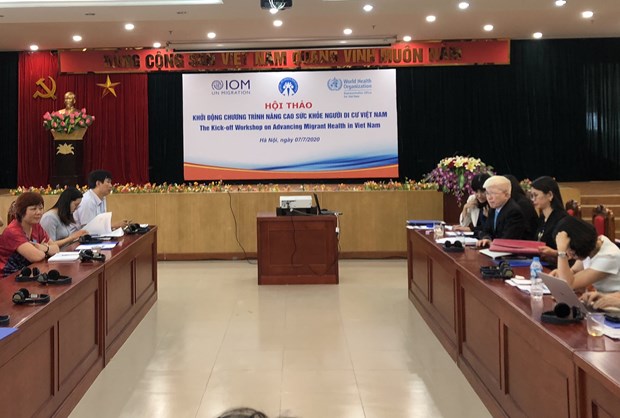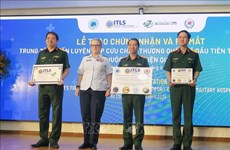Symposium talks improving migrants’ health
 At the event (Photo: VNA)
At the event (Photo: VNA)
Hanoi (VNA) – A symposium was held in Hanoi on July 7 to launch a programme to improve the health of Vietnamese migrants.
The event was co-hosted by the Vietnamese Health Ministry’s General Office for Population and Family Planning, the International Organisation for Migration (IOM) and the World Health Organisation (WHO).
According to the Foreign Ministry’s Consular Department, nearly 6 million Vietnamese went abroad in 2016, mostly those aged 20-39 for study and working.
Deputy General Director of the Office for Population and Family Planning Pham Vu Hoang cited the population and housing census in 2019 as saying that Vietnam had a 96.2 million population, ranking third in ASEAN and 15th globally. In the past five years, migrants aged more than five accounted for 7.3 percent, or about 6.4 million people, mostly in urban areas.
Vietnam is in the period of golden population with 65.4 million in the working
age of 15-64, equivalent to 68 percent of the total.
Last year, the Health Ministry partnered with the IOM and the WHO to conduct a
study on the health of Vietnamese migrants. As a result, several barriers were
found to impact their health, including asynchronous implementation of policies
at the grassroots level.
The study highlighted the need to set up a working group for the health of migrants to offer technical assistance in the building and implementation of health policies, models and projects, Hoang said.
He added that due to the COVID-19 pandemic, migrants also faced the risk of losing jobs, salary reduction and health-related issues.
Former Director of the National Economics University’s Institute of Population
and Social Issues Nguyen Dinh Cu said a programme to improve the health of
migrants will make it easier for Vietnam to enhance its global
integration capacity, including cooperating with countries in the region and the world
in the field.
Participants suggested allocating resources for vulnerable groups and those in
need when it comes to policy making./.













